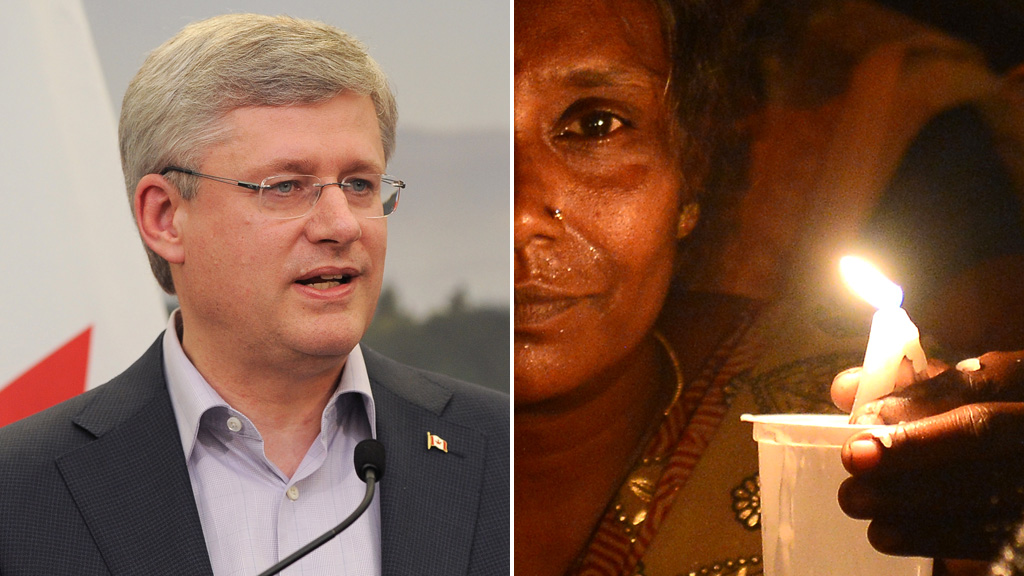Commonwealth crisis: Canada pulls out of Sri Lanka summit
PM brands Sri Lankan human rights violations “unacceptable”
It’s been on the cards for months, now it’s official. Canadian Prime Minister Stephen Harper has said he will boycott next month’s Commonwealth summit in Sri Lanka over serious human rights concerns. By doing so, Canada becomes the first and only country to take such a stand.
In announcing his boycott of the Commonwealth Heads of Government Meeting (CHOGM) in Colombo, Stephen Harper did not pull his punches. Canada, he said, is “deeply concerned” about the situation in Sri Lanka.
“The absence of accountability for the serious violations of human rights and international humanitarian standards during and after the civil war is unacceptable,” he said.
His decision was announced as Channel 4 News revealed that the Commonwealth secretary general had failed to inform the group’s leaders of independent legal advice he had received casting doubt on Sri Lanka’s suitability to host the prestigious summit.
Independent lawyers had informed him six months ago that in their view, the regime was in breach of its own constitution.
The British government confirmed in May that David Cameron and Foreign Secretary William Hague would attend the CHOGM. Tamil rights activists accused it of “collaborating with evil.”
Mr Hague stated that he and Mr Cameron did not believe that a boycott would help bring about improvements in Sri Lanka’s human rights record.
‘Appalled’
Ottawa had previously made clear its misgivings and threatened its boycott: in April this year, the Canadian foreign minister told Channel 4 News that he was “appalled” that the summit would take place in Sri Lanka, which will assume chairmanship of the organisation for a two year period, following the meeting. Alternative venues had been proposed.
According to the United Nations, at least 40,000 Tamil civilians – possibly nearly double that number – were killed in the final weeks of Sri Lanka’s 27-year-long civil war, which ended in May 2009. Allegations of war crimes go to the very top of the regime of Sri Lankan President Mahinda Rajapaksa, which has steadfastly refused to allow an independent investigation.
At the end of August, Navi Pillay, the UN high commissioner for human rights again called for an inquiry, stating bluntly – after a week-long visit – that the island republic, beloved of foreign tourists, was becoming increasingly authoritarian.
Democracy and the rule of law had been eroded, she said.
Today, the Canadian prime minister joined her in citing a litany of concerns: the impeachment of Sri Lanka’s chief justice this year, the “ongoing reports” of intimidation and incarceration of political leaders and journalists, harassment of minorities, disappearances and allegations of extrajudicial killings.
‘Kept secret’
Mr Harper said the Sri Lankan government “has failed to uphold the Commonwealth’s core values” – and it was for that reason, he said, that he had decided not to attend.
But read between the lines and what the prime minister is saying is that Commonwealth Secretary General Kamalash Sharma is, in his view, guilty of undermining the very values set out in the 54-nation group’s new charter, signed by the Queen in March.
Channel 4 News has obtained correspondence which show that the secretary general believed as long ago as January this year, that the impeachment of Sri Lanka’s Chief Justice, Shirani Bandaranayake, “ran counter” to Commonwealth values.
A senior anonymous Commonwealth source has also revealed that a legal opinion from within the Commonwealth secretariat and two independent legal opinions – all of them sought by the secretary general – concluded that the impeachment was unconstitutional.
The source says: “It seems this knowledge was kept secret.”
Asleep at the wheel?
This raises very serious questions as to why the secretary general allowed the Commonwealth summit to be hosted by Sri Lanka at all. Mr Sharma has repeatedly refused requests for an interview – but in light of these revelations, we will today submit a fresh request.
In May, Buckingham Palace announced that the Queen, who is the Head of the Commonwealth, would not be attending the meeting – despite having been present at every commonwealth summit for the past 40 years.
Two months earlier, two former foreign secretaries told Channel 4 News that the Commonwealth secretariat should stop Sri Lanka from hosting the summit. David Miliband described it as a repressive regime, fast “moving towards pariah status.”
The statement by Prime Minister Harper says he has instructed his foreign affairs minister to “review Canada’s financial contributions to Commonwealth programs and the Commonwealth secretariat.”
Chitranganee Wagiswara, Sri Lanka’s high commissioner to Canada, disputed the idea that the human rights situation was bad.
“We don’t accept what is being said,” she told Reuters. “Over the last short period of four years we have made progress which is recognized by most in the international community,” she said.
Thirty years ago, the Commonwealth stood up to the apartheid regime in South Africa, demanding improvements in human rights.
Today the group is struggling for political relevance and its secretary general stands accused of falling asleep at the wheel.
Follow Jonathan Miller on Twitter.

